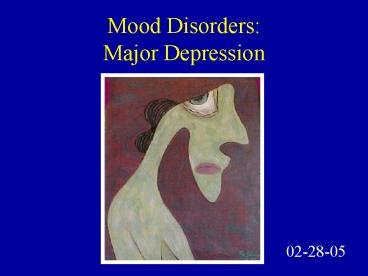Mood Disorders: Major Depression - PowerPoint PPT Presentation
1 / 26
Title:
Mood Disorders: Major Depression
Description:
Sleep disturbance: Insomnia (trouble sleeping) or hypersomnia (excessive sleeping) ... A man, believing that he has completely ruined his car (magnification) when he ... – PowerPoint PPT presentation
Number of Views:172
Avg rating:3.0/5.0
Title: Mood Disorders: Major Depression
1
Mood Disorders Major Depression
02-28-05
2
Mood disorders involve the extremes of mood,
ranging from depression (deep sadness) to mania
(wild elation). Depression is 10 times more
prevalent than mania.
3
Depression involves symptoms in 4 major
psychological domains
- Affective (i.e., emotions)
- Cognitive (i.e., thoughts/perceptions)
- Behavioral
- Physiological
4
Affective Symptoms of Depression
- Sadness
- Feelings of worthlessness
- Feelings of apathy/hopelessness
- Anhedonia (i.e., loss of pleasure or interest in
activities or things)
5
Cognitive Symptoms of Depression
- Pessimism
- Trouble concentrating
- Thoughts/feelings of guilt/self-blame
- Loss of motivation/disinterest
- Recurrent thoughts of death/suicide
6
Behavioral Symptoms of Depression
- Lack of energy fatigue
- Social withdrawal
- Neglect of personal appearance
- Psychomotor retardation (i.e., lethargy slowing
of movements, responses, speech) or psychomotor
agitation (i.e., restlessness) - Crying
7
Physiological Symptoms of Depression
- Decreased or increased appetite/weight loss or
gain - Sleep disturbance Insomnia (trouble sleeping) or
hypersomnia (excessive sleeping) - Disruption of menstrual cycle in women
- Decline in sexual desire
8
Classifications of Mood Disorders
- UNIPOLAR DISORDERS (depressed mood only)
Major
Depression Dysthymic
Disorder - BIPOLAR DISORDERS (depressed and manic/hypomanic
mood) Bipolar I Disorder
Bipolar II Disorder
Cyclothymic Disorder
9
Major Depression (MDD)
- Symptoms of depression are present for at least 2
weeks, represent a significant change in
functioning - At least one of the following 1) depressed mood,
2) anhedonia (loss of interest or pleasure) - Classified as Single Episode or Recurrent Episodes
10
Dysthymic Disorder
- Chronic, continual, and less severe symptoms of
depression that are present for at least 2 years - Individuals may have double depression major
depressive episode during the course of dysthymic
disorder
11
Etiology of Mood Disorders
The Tragedy, Picasso 1903
12
Psychodynamic Theory
- Separation and Anger
- Separation may be real or symbolic loss
- Depressed people are overly dependent because
they are fixated in the oral stage (Freud, 1917) - Anger turned against the self
13
Cognitive-BehavioralTheories of Depression
- Lewinsohns Behavioral Theory
- Becks Cognitive Theory
- Seligmans Learned Helplessness / Attributional
Style
14
Lewinsohns Behavioral Theory of Depression
- Depression is linked with low rates of, or a loss
of, positive reinforcement - Access to positive reinforcement is linked to
three primary factors (see next slide)
15
(No Transcript)
16
Lewinsohns Behavioral Theory Potentially
reinforcing events
- The number, range, or intensity of accessible
events or activities that are potentially
reinforcing to the person may be limited by a
multitude of factors (e.g., age, gender, physical
and personality characteristics)
17
Lewinsohns Behavioral TheoryAvailability of
reinforcement in the environment
- Access to positive reinforcement might be limited
in harsh or isolated environments - Access might decrease after the death of a loved
one or another change in ones social network
18
Lewinsohns Behavioral TheoryInstrumental
behavior of the individual
- Social skills and behaviors are important in
eliciting positive reinforcement. Typical
behaviors of depressed individuals may limit
and/or decrease positive reinforcement (e.g.,
social isolation, pessimistic talk, preoccupation
with self, lethargy).
19
Becks Cognitive Theoryof Depression
- The schema of a depressed person is characterized
by a negative cognitive triad far-reaching
pessimistic views of the SELF, the WORLD, and the
FUTURE - Cognitive biases/distortions include Arbitrary
inference, Selective abstraction,
Overgeneralization, and Magnification/minimization
20
Cognitive BiasArbitrary Inference
- Drawing conclusions on the basis of insufficient
evidence or the lack of any evidence at all - Example A man concludes that he is worthless
because it is raining the day he is hosting an
outdoor party.
21
Cognitive BiasSelective Abstraction
- Drawing conclusions on the basis of one minor
and/or trivial aspect of a situation, which may
be interpreted out of context, and ignoring the
bigger picture. - Example A worker feels worthless when a product
fails to function, even thought she is only one
of many people who contributed to its production.
22
Cognitive BiasOvergeneralization
- Drawing an overall, sweeping conclusion on the
basis of a single event. - Example A student regards his poor performance
in a single class on one particular day as final
proof of his worthlessness and stupidity.
23
Cognitive BiasMagnification/Minimization
- Exaggerations in evaluating performance
overestimating weaknesses and playing down
strengths. - Example A man, believing that he has completely
ruined his car (magnification) when he sees that
there is a slight scratch on the rear fender,
regards himself as good-for-nothing. A woman
believes herself worthless (minimization) in
spite of a succession of praiseworthy
achievements.
24
Seligmans Learned Helplessness Theory of
Depression
- A persons susceptibility to depression depends
on her past experiences with controlling the
environment - If a person sees that her actions continually
have very little effect on the environment, this
expectation may be reinforced and depression may
develop - Learned helplessness an acquired belief that
one is unable to affect the outcomes in ones
life
25
Attribution Style (Abramson)
- People who feel helpless make causal attributions
about why they are helpless attributions may be
internal or external, stable or unstable, and
global or specific - Individuals who make INTERNAL, STABLE, and GLOBAL
attributions about their helplessness are more
likely to be depressed
26
(No Transcript)

